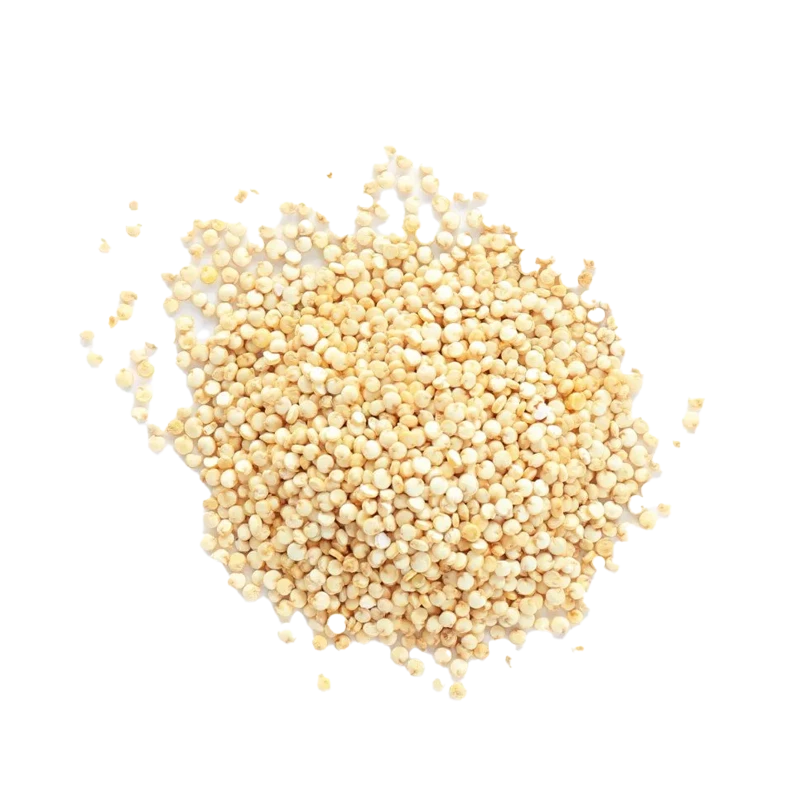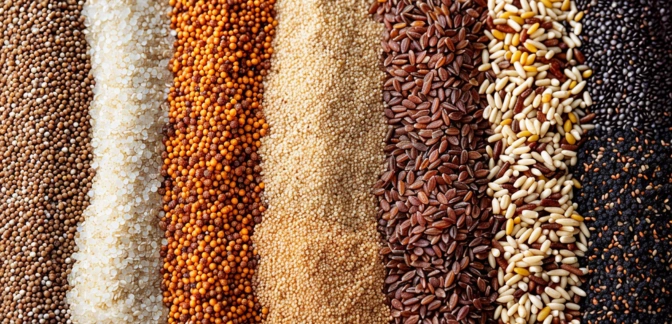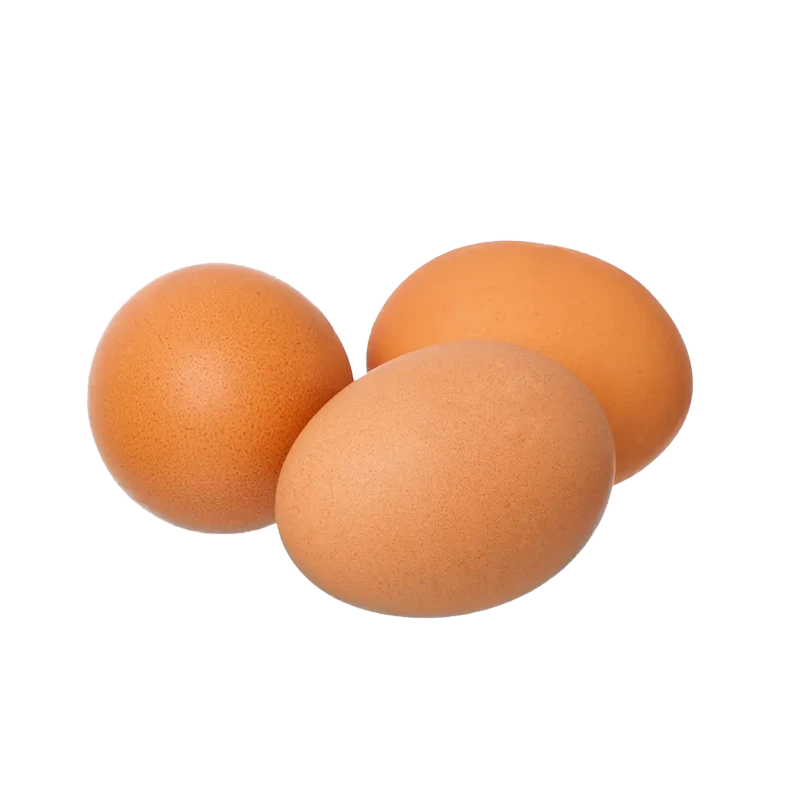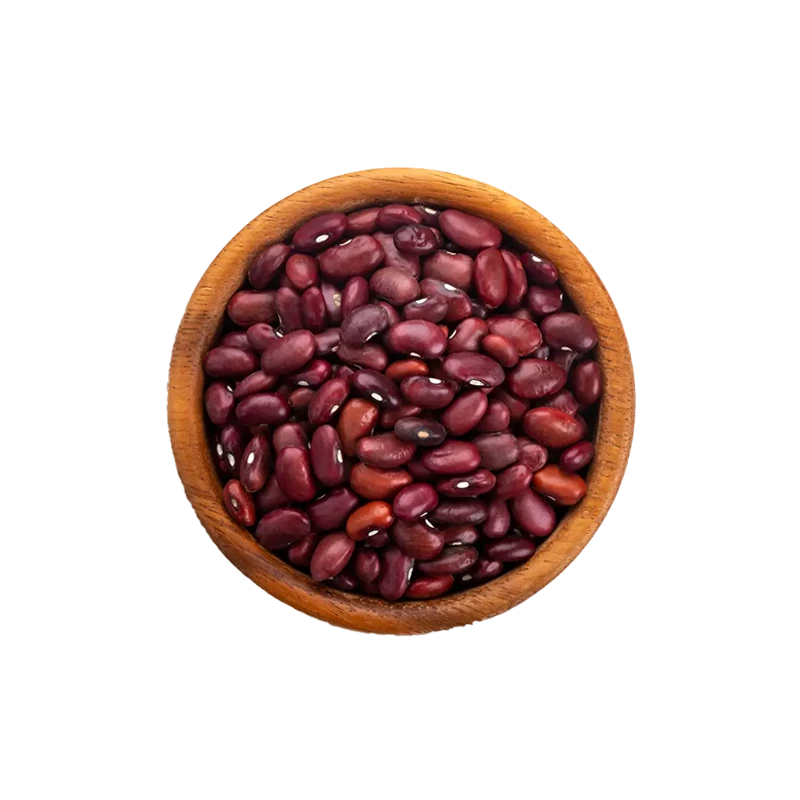Quinoa — Nutrients, Health Benefits, and Shopping Tips

Written by Listonic Team
Last update on September 6, 2024
Quinoa nutrients
Nutrition facts
Amount per 100 g
Calories
🔥 368 kcal
| Nutrients per: 100 g | Value | % Daily Value* |
|---|---|---|
| Carbs | 64 g | 23.27% |
| Fiber | 7 g | 25% |
| Sugars | 4 g | 8% |
| Glycemic Index | 53 | - |
| Protein | 14 g | 28% |
| Sodium | 5 mg | 0.22% |
| Total Fat | 6 | 7.69% |
*The % of Daily Value (DV) tells you how much a nutrient in a serving of food contributes to a daily diet. 2,000 calories a day is used for general nutrition advice.
Quinoa contains more protein than most grains and offers a more evenly balanced array of amino acids.
Encyclopedia of Foods. A Guide to Healthy Nutrition
14 g
🧀 Good Protein Content
7 g
🥔 Good Fiber Content
Quinoa facts & tips
Health benefits
- Complete protein source, containing all nine essential amino acids, which support muscle growth, repair, and overall body function.
- Rich in fiber, promoting digestive health, regular bowel movements, and a healthy gut microbiome.
- Contains essential vitamins and minerals such as magnesium, phosphorus, manganese, and folate, which support overall health and well-being.
- Gluten-free, making it suitable for individuals with celiac disease or gluten intolerance.
- Rich in antioxidants such as quercetin and kaempferol, which help protect the body from free radicals and reduce inflammation.
Health risks
- Potential for digestive discomfort such as bloating, gas, or diarrhea when consumed in large quantities, particularly for those sensitive to high-fiber foods.
- Risk of saponin exposure as quinoa has a natural coating of saponins, which can cause stomach irritation if not properly rinsed before cooking.
- Potential for allergic reactions though rare, some individuals may be allergic to quinoa, causing symptoms like itching, swelling, or difficulty breathing.
- Overconsumption concerns as quinoa is calorie-dense, excessive consumption without portion control can contribute to weight gain.
How to choose quinoa
Quinoa grains should be uniform in size and have a light, nutty aroma. They should be free from dust and debris, indicating they have been properly cleaned. The grains should appear dry and intact, without clumping together.
Avoid quinoa that smells musty or shows signs of moisture, as these conditions can lead to mold growth. Quinoa that is discolored or has an off smell should also be avoided, as it may not provide the best nutritional benefits or flavor.

How to store quinoa
Dry quinoa should be stored in an airtight container in a cool, dry place. Keeping it in the pantry helps maintain its quality and freshness. Properly stored, quinoa can last for up to two years.
Exposure to moisture can cause quinoa to spoil and lose its nutritional value. Avoid storing it near heat sources or in humid environments. Always ensure the container is tightly sealed to keep it fresh and prevent pests.
✅ Extra Tip
How long does it last?
Quinoa can last for 2-3 years when stored in an airtight container in a cool, dark place. Cooked quinoa should be consumed within 5-7 days if kept in the refrigerator. For longer storage, cooked quinoa can be frozen for up to 6 months.
What to do with leftovers?
Leftover quinoa can be used in a variety of healthy and hearty dishes. Toss it with fresh vegetables, nuts, and a tangy vinaigrette for a quick quinoa salad, or mix it into a grain bowl with roasted vegetables and your choice of protein. Quinoa is also great when added to soups or stews, where it adds texture and nutrition.
Use quinoa as a base for a stir-fry with vegetables and tofu, or mix it into a pancake or waffle batter for added protein. If you have a lot of quinoa, consider making a batch of quinoa patties by mixing it with breadcrumbs, eggs, and seasonings, then frying until golden. Quinoa can also be used as a filling for stuffed vegetables like bell peppers or zucchini, or added to casseroles for added texture and flavor. For a quick snack, toss quinoa with dried fruits, nuts, and a drizzle of honey for a nutritious treat.
👨⚕️️ Medical disclaimer
How quinoa supports specific health conditions
Quinoa is a gluten-free grain rich in plant-based protein, supporting muscle health and tissue repair. It is also high in fiber, promoting digestive health by aiding in regular bowel movements. Quinoa contains important vitamins and minerals, such as magnesium and iron, supporting bone health and blood health. Its low glycemic index makes it a great option for blood sugar control, and it is versatile in both savory and sweet dishes.
Discover products from other categories
Listonic Team
Fact-checked
Our editorial team checked this article to make sure it was accurate at the time of publishing it.
Get the top-rated shopping list app







